The dozen or so people who attended a forum for candidates for Greene County supervisor Oct. 6 heard candidates express differing viewpoints, some of them critical of each other, while maintaining civility.
The forum was hosted by the Rotary Club of Jefferson as a service to county voters. Rick Morain served as moderator. Masks were required.
Each candidate opened with a short introduction, beginning with the candidates for District 5, which is entirely in Jefferson but does not include all of Jefferson. Democrat Ginny Showman is challenging incumbent Republican Pete Bardole.
Showman moved the Jefferson four years ago. She volunteers with Jefferson Matters: Main Street, is a member of the board of the non-profit History Boy Theatre, and is president of the Friends of the Jefferson Public Library.
She said being a newcomer to the community means she doesn’t know “how things have always been done. I can look at things with a new set of eyes and new perspective.”
Pete Bardole grew up on the family farm in Rippey; he still farms there with his father and brother. He has a degree in business from Briar Cliff College. He was on the Greene County Farm Bureau board for nearly 20 years. He said he gained leadership skills that have done him well. He’s finishing his first term as supervisor.
He has enjoyed the challenges of being on the board supervisors, he said.
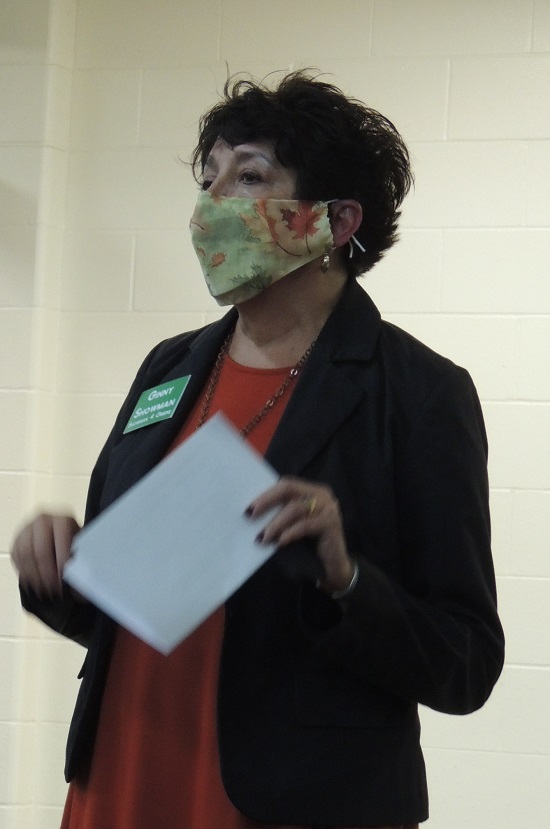
Ginny Showman 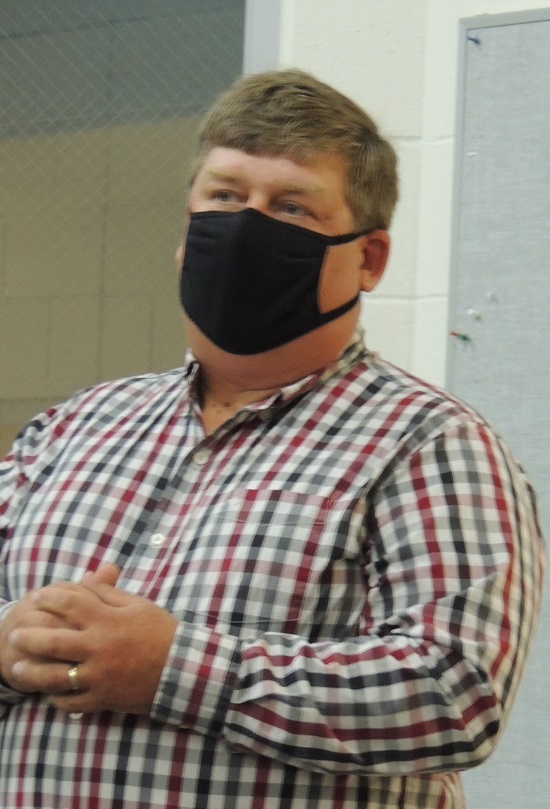
Peter Bardole
In District 4 – generally the southeast quarter of the county – Republican John Muir is challenged by Democrat Chris Henning.
Muir was born and raised in Greene County. He graduated from Perry High School and then attended Iowa State University. He farms near Rippey. He’s been on the board of supervisor 14 years, having been first appointed to fill two years of a vacated term. He’s been board chair many of those years. “I’ve learned a lot of things, worked with a lot of great people. It’s made me a better person, a more rounded person in understanding where people are coming from when we have all these discussions. I really enjoy the job,” he said.
Henning calls herself a “boomerang” person, having grown up in Greene County, left after graduating from high school, and then returning after 30 years. She worked in Des Moines for 25 years in labor relations, personnel, and then management, and then spent five years in Phoenix organizing trade shows for high tech companies. She returned to Greene County in 1992 and has served 16 years as a Franklin Township trustee and four years on the soil and water conservation board. She has volunteered with Jefferson Matters: Main Street, and the Sierra Community Theatre board, and has been manager of the Greene County farmers market for many years.
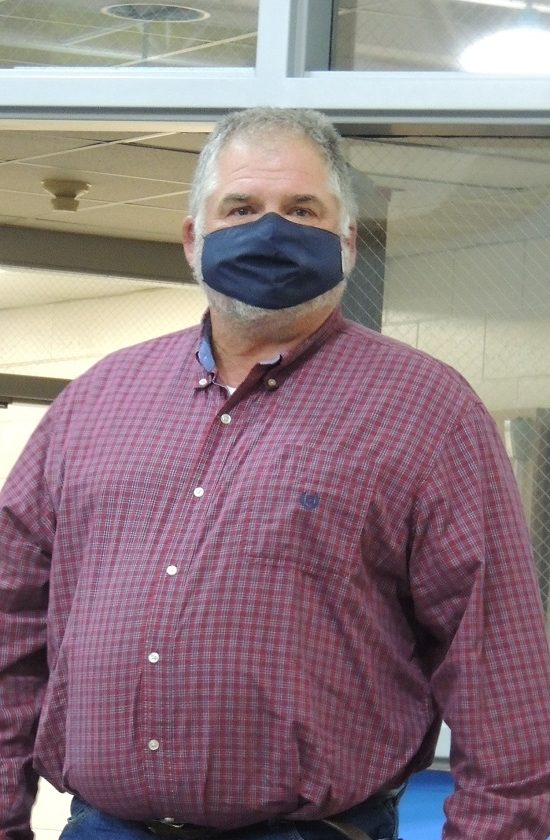
John Muir 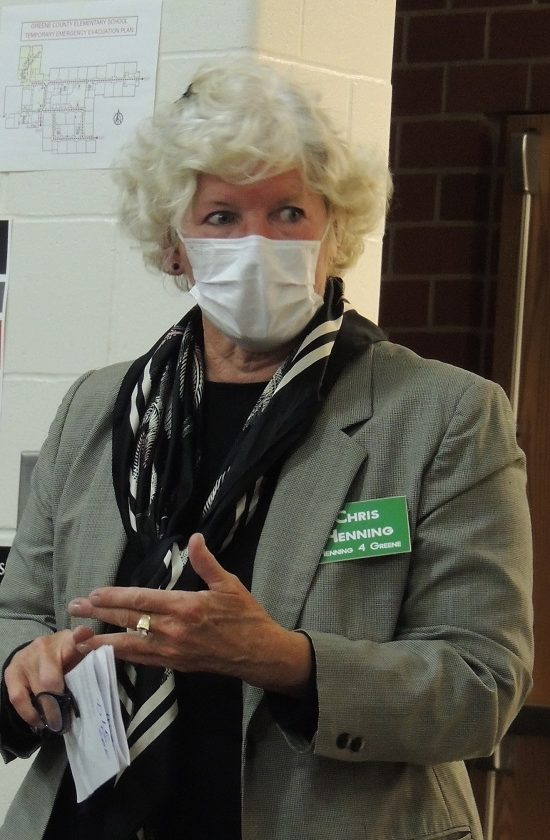
Chris Henning
In District 1 – the northeast quarter of the county – Democrat Linn Cipperley-Price is challenging incumbent Republican Mick Burkett. Price grew up in Storm Lake and left because there weren’t jobs there. She went to North Iowa Area Community College (NIACC) in Mason City, and left there because there weren’t any jobs. She served three years in the U.S. Army in the Veterinary Corps. She then earned a degree in biology at Iowa State University. She has volunteered with P.A.W.S. and the American Red Cross, and has taught first responder classes for the Red Cross. She is the founder of Animal Protection and Education (A.P.E.) charity, the largest non-profit in Iowa dedicated to providing low-cost spay and neutering for cats, particularly community cats.
“I’m a person that gets going. If somebody needs help, I’m willing to roll up my sleeves and help them. That’s why I’m running,” Price said.
Burkett was born and raised in Dana and now lives in Grand Junction. He worked for East Greene Schools for 30 years and served two terms as mayor of Grand Junction in the early 1990s. He is in his eighth year on the board of supervisors. “I’ve enjoyed it – it’s a learning experience – and working with really good people. All our different departments are very good to work with. I’d like to serve the people of Greene County for another four years,” he said.
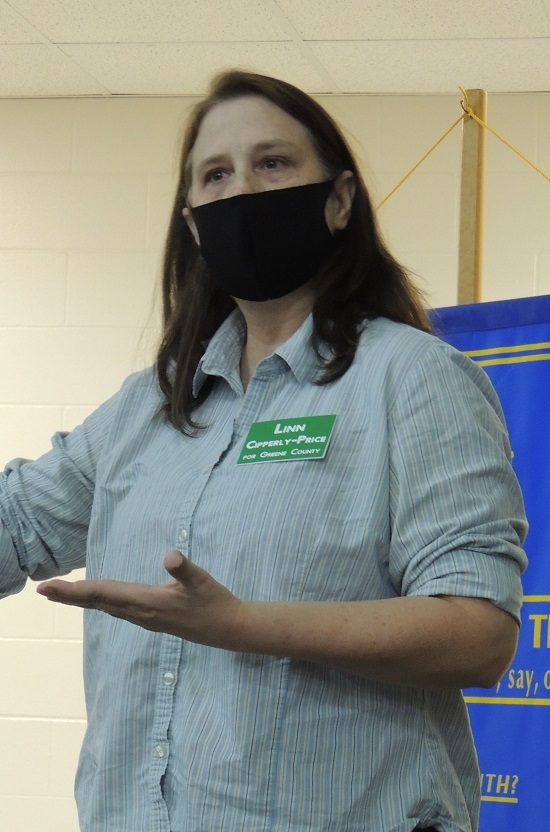
Linn Cipperley-Price 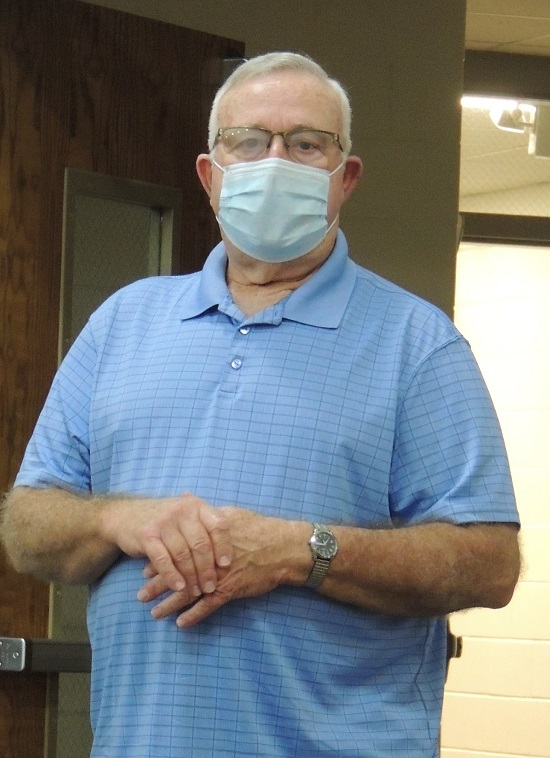
Mick Burkett
The first question of the evening came from moderator Morain. He noted that the county has millions of dollars available in tax increment financing (TIF) revenue from the wind turbines in the northeast portion of the county. The supervisors committed $5 million in TIF funds to the new career academy adjacent to the high school. Morain asked how other TIF money should be spent.
The incumbents have the advantage of working through the process and knowing the legal uses for the money.
Muir answered first, saying he has no regrets about the money spent on the career academy. “I think that was looking toward the future of the county and the region,” he said. He said there are many restrictions on how TIF funds can be used, and the purchase of the Midland Power office building and work on the courthouse do not qualify. He said he’d like to use TIF money “to help lessen the tax burden we have to put on the taxpayers.”
Bardole said he wants to be sure the county doesn’t over-extend on commitments from TIF funds in case the tax laws change. “At this point, unless another big project comes up, if we can use it for reduction of property taxes, that may allow some money that’s coming in to go for other projects, like working on the courthouse. I look at most of it for tax reduction,” Bardole said.
Burkett said TIF money can be used on county roads. Using TIF money instead of tax dollars for roads and bridges would help taxpayers, he said. He’d like to see property tax dollars redirected to work on the courthouse.
Henning, Price and Showman all admitted to not knowing all the restrictions. Henning said she’d like to see needed projects – like a new jail and HVAC work at the courthouse – that can’t be done with TIF money, balanced with other projects that could be done with TIF money.
Showman said she’s working as part of a coalition between Grow Greene County, Greene County Community Development Corporation and other entities to work on affordable housing. She said 30 percent of the people who work in Greene County live elsewhere. She’d like to free up tax dollars to use for efforts to increase affordable housing to attract new residents, including assistance for incoming renters.
Price said lessening the tax burden on county residents would be ideal. She said she’d like to see the career academy incorporate new ideas in farming, including niche farming. She said we need safe roads and animal control.
The first question from the audience came from Nancy Hanaman of rural Rippey. She asked what’s been done in the past to promote clean air and clean water, and what each candidate would like to see done in the next few years.
Bardole said that when talking about animal operations, the county has to work within the master matrix of the Iowa Department of Natural Resource. He raises hogs with his brother, father and nephew. He said they try to be very careful about the amount of nutrients they put on their fields, and they use cover crops to keep nutrients in place. He said the supervisors look for trees and landscaping on plans for confined animal feeding operations (CAFOs) to improve air quality.
Henning is president of the Raccoon River Watershed Association board. She’s been part of the group since 2006. She said Jefferson is a river city, 89 miles upstream of 500,000 people. “What we do on our farms and our towns makes a difference to lots of lots and people. But we’re 100 miles downstream with nearly 20,000 acres of drainage that affect our river tourism, our environment, our water tables, our water supply, our cities and our private wells.”
Henning has vocally opposed new CAFOs at several public hearings in recent years due to their impact on water and air quality.
“I’m not anti-pig. I grew up on a hog farm…. Comments like Mick Burkett’s ‘just drink bottled water’ and John Muir’s ‘our hands are tied’ are not helpful. Citizens deserve better leadership. I partner to protect our natural areas, our natural resources. We face challenges. The idea that ‘we’ve always done it this way’ is obsolete. I think we need to lead for the future for all of Greene County,” Henning said.
Muir said the county uses the master matrix and “I’m not comfortable with saying, ‘Here’s what the rules are, but we might change them drastically so you can’t meet them’.” He said the state needs to look at the matrix and tweak it some, but until then, it’s the only tool they have.
He also said that a fish kill in Hardin Creek a year ago, although a cause was not found, showed the DNR watches CAFOs carefully.
Showman noted the question didn’t specifically refer to hog CAFOs. She said that with 102 CAFOs in the county, “There comes a point where there’s saturation. It’s not feasible to support our air and water quality when you have so many…. We need to listen to the citizens who are adversely affected or positively affected by this.”
She added that like Price, she thinks there are other, different things farmers can do to make money without building hog lots.
Burkett said the problem with water quality is city residents and golf course operators fertilizing lawns. “I think the farmers are doing a very good job, putting in cover crops and taking care of their fields. But let’s go back and talk about where all the run-off water from Jefferson goes. It goes into storm sewers and right into the river,” he said. “I think we need to educate our local people. The farmers are doing a very good job. We ought to do more in the cities and the golf courses.”
Price spoke next. “Mr Burket, you’re right. Everybody is deficient. But this attitude that the farmers are doing everything great needs to stop.”
She told of calling the DNR after people farming nearby land knifed manure into frozen ground. The DNR wouldn’t act on the complaint if it was anonymous, she was told.
She said one of the things that prompted her to run for supervisor was the anger of her friends and neighbors after 15 people spoke at a public hearing against the Stumpf Finishing CAFO and only one supervisor voted against recommending approval of the construction permit. “You’re not even listening to the citizens when they do have a complaint.”
Craig Hertel asked the candidates about their priorities in agricultural drainage, and what actions they might take regarding drainage.
Price said she’d be willing to talk with the DNR and learn more about drainage and water quality. She said Louis Dreyfus drained the wells of Dana residents when it opened the nearby ethanol plant. She said “we need to learn more about it (drainage) and be sure it works for everyone.”
Muir said there are concerns about the control of drainage districts, and that he wouldn’t be opposed to monitoring where drain tiles go into a pond, creek or open ditch. He said the goal should be to pinpoint where the problems are, “but we can’t do a blanket rule on everybody. It will be a severe one, but agriculture is still our biggest industry.”
He said there should not be regulations on what inputs can be put on fields to protect watersheds.
Showman said she doesn’t know much about drainage, “but because I’m not a farmer, I don’t have a personal stake in this. I don’t have to worry about what I’m going to do that will help me or help my farm.” She said she’d listen to experts about how drainage on one farm affects another farm. “We’re all downstream from somewhere,” she said.
Bardole pointed out that without the drainage tile system, Greene County would not have productive soil. The tile systems also help keep gravel roads drivable.
Henning farms 320 acres in Franklin Township. Some of her farm ground is where Bullhead Lake was drained in 1915. She said there are many different things the supervisors have to look at as trustees of drainage districts.
Patty Naylor of rural Churdan asked how elected officials should bring the community together to respond to the pandemic.
Burkett talked about face masks. He said masks are “a good thing in a confined place,” but the supervisors can’t mandate wearing masks.
Muir said he and Bardole started meeting with the county’s emergency operations center for Covid-19 response in March. He said masks were required in the courthouse early in the pandemic. “As far as getting people on the same page, it’s not an easy task,” he said.
He added that he thinks the state will mandate face masks before the pandemic is over. “I don’t know what that will look like. I know our law enforcement isn’t looking forward to a day when that happens,” he said.
Price said it would be impossible to enforce a mask mandate. She said she remembers when the seatbelt law was enacted in 1986. “Everybody complained and moaned. But now we put it on and we don’t even think about it.”
She left the audience with the name of Darla Eileen Brown, her cousin who died in Sioux City of Covid-19 on May 11. She was 54 years old.
Showman said bringing people together requires leaders to show strength and support “and say this is what we should be doing and this is how we’re going to achieve it.” She doesn’t think a mask mandate will ever be issued, but she’d like leaders to model an attitude of wearing a mask for other people. “Don’t think of it as ‘I have to do this.’ Think of it as ‘I want to save you’.”
She also said county leaders should assure everyone has access to mental health services and access to high speed internet. “If we all have access to the same infrastructure, it would even the playing field and let people feel like we’re all part of the same community,” she said.
Henning agreed the supervisors should set an example of wearing masks, and that the local role of community leaders is to make a difference. She suggested that: the supervisors should continue to provide Zoom access to their meetings with video and adequate microphones; the supervisors hold listening posts in the county libraries; board meetings be moved to evenings to make them accessible to working people; and the supervisors should convene a professionally-led task force of government officials, businesses, and non-profits to address the impacts on the county of Covid, the derecho and the drought.
Bardole said he has tried to lead by example, and that the supervisors did approve a resolution in support of wearing masks. He said mental health concerns were mentioned at emergency operations center meetings.
Each candidate gave a brief closing statement.
Bardole said he jumped in with both feet when he was elected four years ago. “It’s something I truly enjoy. I think I make a difference… to the people of Greene County, and I definitely try to move Greene County forward. To me it’s all about building our community.”
Burkett said he’s in his eighth year on the board, and that it took more than a year to “catch on to everything that happens.” He said he’d like to see the repurposing of the Midland Power building as a law enforcement administration building completed, as well as building a new jail.
Price said she’s running because of neighbors who feel like they aren’t being listened to, and that she’ll strive to be sure everyone feels heard. She said although she didn’t grow up in Greene County, she grew up in a farming community and knows the importance of agriculture.
Henning said she believes “if you think something should be done, you should speak up and be part of the solution.” She said she has years of rural and urban leadership experience, common sense, and fiscal responsibility. “I’m passionate about bringing people together to seek creative answers for our future in Greene County… I’d be proud to do my part growing Jefferson and Greene County’s place in Iowa’s rural economy,” she said.
Muir said he’s excited about what’s happening in the county, with new housing, new industry, the school and career academy. “I think everyone in Greene County should be proud of where we’re at. I think every taxpayer is proud of our county government and our employees,” he said.
Showman said she’s running because she’s excited about the direction the county is headed. “There are so many things that are good here that we can build upon. When we bring people together from the entire county… and welcome their thoughts, that’s how we can move on…. What I can do is put my energies toward making things even better than they are now,” she said.
